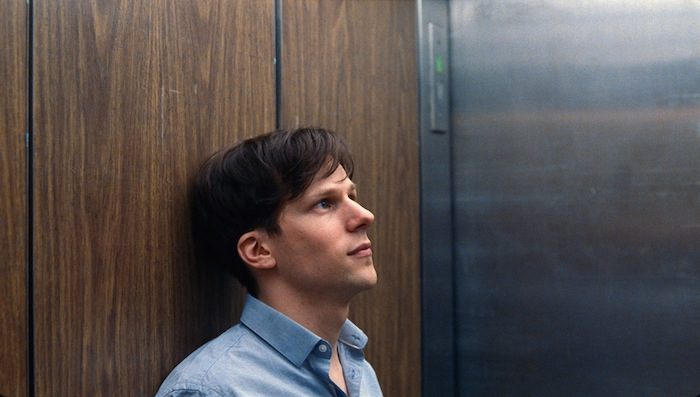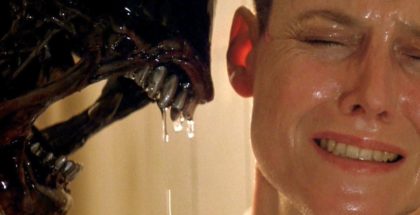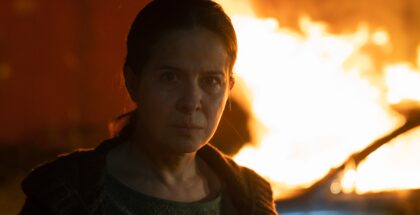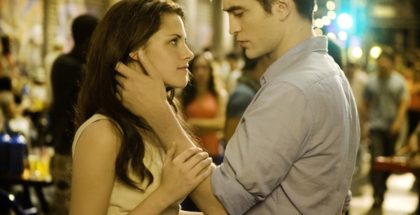VOD film review: Louder Than Bombs
Review Overview
Cast
7Direction
7David Farnor | On 17, Aug 2016
Director: Joachim Trier
Cast: Jesse Eisenberg, Gabriel Byrne, Isabelle Huppert, Devin Druid
Certificate: 15
“Can I take a picture that tells their story the way they would have told it?” That’s the eternal dilemma of Isabelle (Huppert), a war photographer with an arsenal of shots from Syria. It looms large over her whole family in Louder Than Bombs – despite the fact that when we start the film, she’s already dead.
The way it overshadows them, though, is never quite in the way you expect. And that’s what makes director Joachim Trier’s English-language debut so effective. Where other films tackling similar themes might follow the immediate aftermath of her passing, here, we watch her widower, Gene (Byrne), trying to reconnect with his sons years after the fact. Jonah (Eisenberg), the eldest, returns to help sort through his mum’s photographs for an upcoming exhibition. The youngest, Conrad (Druid), though, is still living with him.
What follows is a study of grief in gruellingly close quarters, with the three troubled men all under the same roof.
Byrne, a perpetually underrated screen veteran, is perfectly cast as the lonely husband, a former heartthrob who gave up his career as an actor to look after his family – and has the lines on his face to prove it. Now, he’s a teacher at Conrad’s school and is slowly forging a relationship with one of his teachers (an excellent Amy Ryan). While he’s opening himself up, though, Conrad only seems to be shutting himself down; Devin Druid is remarkably good as the reticent teen, as much a frowning recluse as his father, prone to spending hours online killing fantastical creatures and, in one superb scene, imagining that he has the power to make the hair of his school crush blow back with just his mind.
Into their passive aggressive silence stumbles Jonah, with Eisenberg in solid neurotic academic mode – the fact that he can act this part in his sleep doesn’t make it any less convincing. But it gradually emerges that his life is just as messed up, even with his wife giving birth to their child at the start of the film. The opening frame sees the baby grasp Jonah’s finger. It’s the only gentle family connection we ever really see; there’s more affection between Huppert and the cast.
Her ghostly presence haunts the film, with flashbacks repeatedly showing us her in war zones, in between glimpses of the way it was portrayed through her lens. “Mum showed me how she could change the meaning of a picture by framing it differently,” says Jonah, in a rare, intimate conversation.
That’s what Trier and screenwriter Eskil Vogt then proceed to do, shifting the picture on screen to present us with the same tragedy over and over again. Huppert haunts each of the trio’s hallucinatory dreams, always appearing differently, at a different age or with a different expression. But there’s a consistent melancholy to her eyes that shines through, something that hints at the truth of her car accident that Isabelle’s colleague, Richard (David Strathairn), wants to write about in a newspaper column to go with the gallery retrospective.
That means that Gene has to talk to Conrad about what really happened that night. He asks for his elder son’s help, but they can’t even agree on what the truth is, let alone whether to tell him.
The disjunct between the men only gets stronger, as we replay scenes from multiple perspectives, from Gene’s detached confusion over Conrad’s behaviour after school to a moving narration of those actions in Conrad’s creative writing – that, crucially, is read aloud by Jonah. These moments aren’t always the most subtle, but Trier’s handling of chronology and camera positioning is impeccable, while the cast underplay the exchanges brilliantly – every time you expect sparks to fly, things remain muted and introspective.
While you might read that as the formula for an inert drama, what Trier captures is the clashing realities of these characters, as their deceptions come to the surface, whether that’s to shelter others from harsh facts or to make themselves feel better. At one point, Jonah’s ex thinks his wife has cancer, something he doesn’t correct. Why? We don’t really know. But just as Isabelle struggled with the responsibilities of her job, Louder Than Bombs deftly explores the way we all tell stories constantly, not just in death but in life.
“They will laugh at you, they will destroy you,” Jonah warns Conrad, when he suggests sharing his writing with people at school. Perhaps, in such cold, yet heated moments, these three are the only ones who can see through each other’s stories. The sadness lies in the fact that they still keep trying to tell them anyway.
A bit more fire to go with the chilled conflict would occasionally be nice, especially in the final act, but for the most part, the silence speaks volumes. Trier’s ensemble share an engrossing, moving tale – and he tells it with depth and nuance.




















